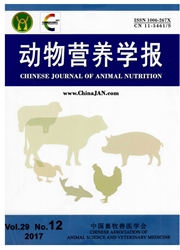

 中文摘要:
中文摘要:
动物肠道内消化代谢产生的各种营养素或其他化学物质,能够通过肠道内分泌和营养素感应系统发挥生理效应。作为肠道内分泌和营养素感应系统重要的组成部分,肠道内分泌细胞通过表面的感应受体(氨基酸感应受体、脂肪酸感应受体和葡萄糖感应受体等),识别感应肠道内各类营养素,不仅调节营养素吸收和代谢,同时能够分泌脑肠肽(胰高血糖素样肽-1、酪酪肽、胆囊收缩素等)。脑肠肽通过由中枢神经系统、自主神经系统以及肠神经系统构成的脑肠神经网络,参与调控机体摄食行为及其他生理功能。本文就动物肠道内分泌系统、脑肠轴以及营养素感应受体等方面研究进展进行综述。
 英文摘要:
英文摘要:
A variety of nutrients and chemicals in the gastrointestinal( GI) tract exert physiologic effects via enteroendocrine and nutrient sensing system. As a part of enteroendocrine and nutrient sensing system,enteroendocrine cells can detect luminal nutrients via nutrient sensing receptors( amino acids sensing receptors,fatty acids sensing receptors,glucose sensing receptors,etc.). Enteroendocrine cells not only can regulate nutrient absorption and metabolism,but also can secret kinds of gut-brain peptides( glucagon-like peptide-1,peptide YY and cholecystokinin,etc.). Gut-brain peptides through the gut-brain axis,which is composed of central neuron system,automatic nervous system and enteric nervous system,regulate host feeding behaviors and other physiologic functions. This review summarized recent advances on animal enteroendocrine system,gut-brain axis and nutrient sensing receptors.
 同期刊论文项目
同期刊论文项目
 同项目期刊论文
同项目期刊论文
 期刊信息
期刊信息
